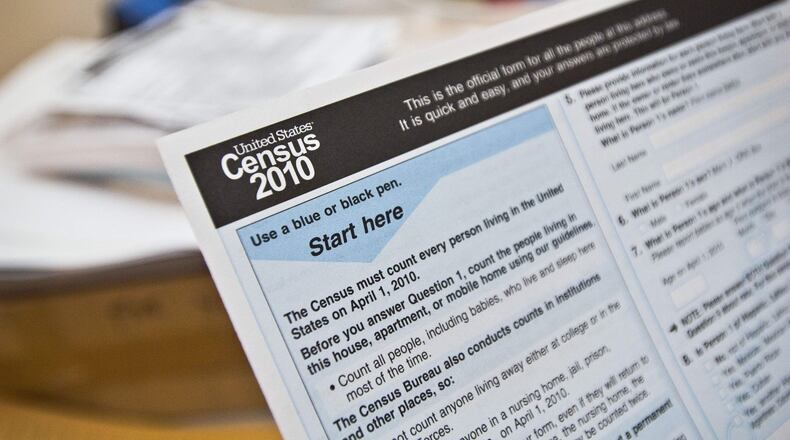Critics fear the question will stifle immigrant response rates, leading to an under-count of the Latino population and other communities. The federal government says the move is not meant to deter anyone from filling out the census and that the data being collected will only be used in aggregate for legitimate government purposes.
EARLIER COVERAGE: Feds want to add citizenship question to U.S. Census
“What it could potentially do is just further discourage immigrants from participating in the count, especially if you don’t know how the information could or would be used against you,” said Karen Bradley, an immigrant from Belize and an immigration attorney in Dayton.
Citizens living with or related to non-citizens could be afraid to answer the questionnaire truthfully out of fear of their loved ones being arrested or deported, she said. “The census would never be accurate if you have to list everybody in your household and make a decision to say whether they are a U.S. citizen or not.”
Kathleen Kersh, staff attorney at Advocates for Basic Legal Equality, said even people who are in the U.S. legally might hesitate on a citizenship question.
“People who are not U.S. citizens are not necessarily undocumented,” she said, but they might be fearful of what the government will do with their information.
An accurate count of all people living in each state is crucial because billions of dollars in federal funding gets distributed based on the census and the number of representatives each state gets in Congress depends on the 10-year count.
RELATED: Concerns raised over 2020 census accuracy, funding
“We have difficulties already getting populations of color to fill out the census form,” said Branford Brown, executive director of the Miami Valley Urban League. Much of that has to do with distrust of the government, he said, which has worsened under the current administration.
“Were this another administration maybe we wouldn’t be so suspicious,” he said.
The Department of Justice requested that the citizenship question be added to the short-form in order to collect better data on the voting-age population and better enforce the Voting Rights Act, which protects minority voting rights.
“Secretary Ross determined that obtaining complete and accurate information to meet this legitimate government purpose outweighed the limited potential adverse impacts,” a statement from the Department of Commerce announcing the addition of the question said.
In a memo about the decision, Ross said he hadn’t seen any evidence that reinstating the question, “would materially decrease response rates among those who generally distrusted government and government information collection efforts, disliked the current administration, or feared law enforcement.”
RELATED: Ohio’s elections chief at odds with Trump over claims of voter fraud
In advance of the Census Bureau officially submitting the citizenship question to Congress on March 29, New York’s Attorney General Eric Schneiderman said he was leading a multi-state lawsuit to remove it.
The suit, filed April 3 in Manhattan, was joined by attorneys general from Connecticut, Delaware, Illinois, Iowa, Maryland, Massachusetts, Minnesota, New Jersey, New Mexico, North Carolina, Oregon, Pennsylvania, Rhode Island, Virginia, Vermont, Washington and the District of Columbia. The cities of New York, Chicago, Philadelphia, Providence, San Francisco, and Seattle; and the bipartisan U.S. Conference of Mayors also joined the lawsuit.
More than 160 mayors — including Dayton Mayor Nan Whaley, Columbus Mayor Andrew Ginther, Cincinnati Mayor John Cranley, Cleveland Mayor Frank G. Jackson and Lima Mayor David Berger — signed a letter to Commerce Secretary Wilbur Ross asking that the question be removed.
“Adding a citizenship question to the decennial census would not promote the constitutional mandate of the census, but in fact, may compromise it. Such a question would increase the burden on respondents, likely heighten privacy concerns around the census, and lower participation by immigrants who fear the government will use this information to harm them and their families,” the letter said.
The questions are out of Ross’ hands now, and it would be up to Congress to reject the question unless a federal court intervenes on behalf of the states’ lawsuit.
RELATED: How much did Montgomery County grow last year?
Organizations like the Jewish Council for Public Affairs, the National Urban League and the Mexican American Legal Defense and Educational Fund (MALDEF) have called on Congress to reject the question. MALDEF also called for Ross to resign.
“Over the years, presidential administrations of both parties have administered the Census scientifically and moderately, refusing to politicize a sacred constitutional mandate that goes back to our nation’s beginning,” President of MALDEF Thomas Saenz said in a statement.
“The Trump administration ended that tradition, opting to politicize the decennial enumeration of all persons by precipitously adding an unnecessary citizenship question in the clear hope of reducing the count of Latinos, the nation’s largest minority group.”
About the Author
